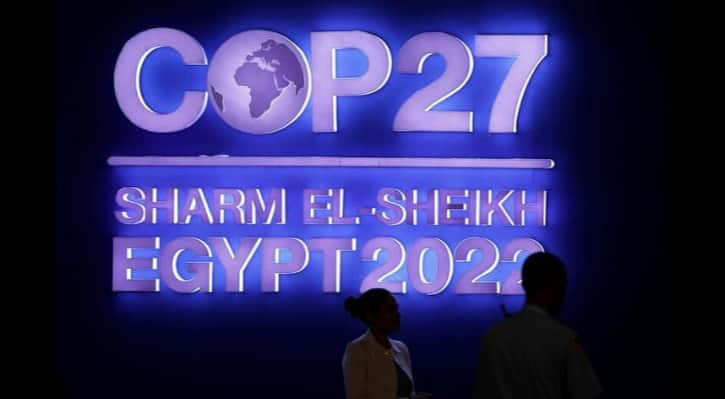New Delhi: India has submitted its long-term plan to achieve the net-zero target by 2070, emphasising climate justice, sustainable lifestyles and equity to the United Nations Framework Convention on Climate Change (UNFCCC). Under the Paris Agreement, countries are required to submit long-term low-emission action plans to help achieve the global goal of limiting temperature rise to 1.5 degrees Celsius as compared to the pre-industrial average. So far, 58 countries have submitted their long-term low-emission development strategies (LT-LEDS).
Short-term action plans to limit the global temperature rise to 1.5 degrees Celsius are called nationally-determined contributions or NDCs that the countries have to submit every five years. Net zero means achieving a balance between the greenhouse gases put into the atmosphere and those taken out.
India's long-term vision of transition in all sectors of economy
Launching the strategy at the ongoing UN climate summit in Egypt, Union Environment Minister Bhupender Yadav called it a long-term vision of transition in all sectors of the economy, including electricity, transport, industry, urban, forestry, and carbon removal technologies.
According to Bhupender Yadav, India's approach to low-carbon development is based on four key considerations -- low historic contribution to global warming, energy needs for development, commitment to low-carbon growth according to national circumstances, and the need to build climate resilience.
Yadva told PTI that the strategy emphasises "climate justice", "sustainable lifestyles" and principles of equity and common but differentiated responsibilities and respective capabilities. It also imbibes the spirit of LiFE (Lifestyle for Environment), adding "LT-LEDS has been prepared in the framework of India's right to an equitable and fair share of the global carbon budget. This is the practical implementation of India's call for climate justice."
The carbon budget is the amount of carbon dioxide that the world can emit while still having a chance to contain global warming within 1.5 degrees Celsius compared to the pre-industrial levels, as set down by the Paris Agreement.
India emphasises energy security, energy access and employment
Union Environment Minister Bhupender Yadav further said that India's strategy emphasises energy security, energy access and employment while focusing on the vision of "Aatmanirbhar Bharat" (self-reliant India) and "Make in India".
India also called upon developed countries to elaborate on their immediate plans on how they would achieve their targets, he said, adding "We see that following the current energy crisis, many have turned back to increased fossil fuels for energy security. It is not enough to say that targets for emissions reduction will be met, when the reality is that they will unequally consume even more of the carbon budget."
Yadav is further quoted by PTI as saying, "In a COP of Implementation, it is essential to make progress on adaptation and loss and damage. Now is the time to tell the developing world how the promise of USD 100 billion is to be met. We, at Glasgow, noted with regret that it is indeed not being met. The world would like to know how the resources for meeting the world's adaptation needs, whose estimates are rising constantly, are to be mobilised."
He added, "We cannot have a situation where the energy security of developing countries is ignored in the name of urgent mitigation, while developed nations put their energy security above their duty to increase their ambition to mitigation through practical action."
Initiative to address water security, climate impacts launched
Egypt`s COP27 Presidency, in partnership with World Meteorological Organization (WMO), launched AWARe (Action on Water Adaptation or Resilience), an initiative that will champion inclusive cooperation to address water-related challenges and solutions across climate change adaptation.
AWARe was launched during the opening session of COP27`s Thematic Day for Water with addresses by Hani Sewilam, Egypt Minister of Water Systems, and Irrigation; Ambassador Ayman Amin Tharwat, Deputy Director for the Department of Climate, Environment and Sustainable Development for the Egyptian Ministry of Foreign Affairs; and Elena Manaenkova, Deputy Secretary General of WMO.
AWARe aims at contributing to a successful outcome at the 2023 UN Conference on Water and it brings together the Water and Climate Coalition, the Adaptation Action Coalition as well as the Marrakesh Partnership Climate Action Pathway Water towards scaling up adaptation action.
Speaking on the initiative on Monday, COP27 President Sameh Shoukry is quoted by IANS as saying, "Increasing water demand from a growing population and variable supply does not make for sound economics. As we work to design and implement solutions across adaptation, water management must feature prominently in the discussions and actions."
He further said, "Water is life and is vital to sustaining lives and livelihoods. Through the AWARe initiative we are bringing together stakeholders to alleviate the challenges faced by the world`s vulnerable communities and ecosystems."
In close cooperation with African Union (AU) and African Ministers` Council on Water (AMCOW) among other stakeholders, the initiative aims at offering transitional adaptation solutions for the planet and people.
AWARe will focus on three priorities for action: decrease water losses worldwide and improve water supply; propose and support implementing mutually agreed policy and methods for cooperative water-related adaptation action and its co-benefits; and promote cooperation and interlinkages between water and climate action in order to achieve Agenda 2030, in particular SDG 6.
The AWARe initiative promotes measures to decouple economic growth from freshwater use and degradation; develop national utilization plans, adaptation and mitigation strategies and protect and restore freshwater ecosystems; seek cooperative analysis of river basin scale adaptation and mitigation options and risk of mal-adaptation and support mutually agreed policy solutions to advance a `do-no-harm` approach.
(With Inputs from PTI/IANS)
















